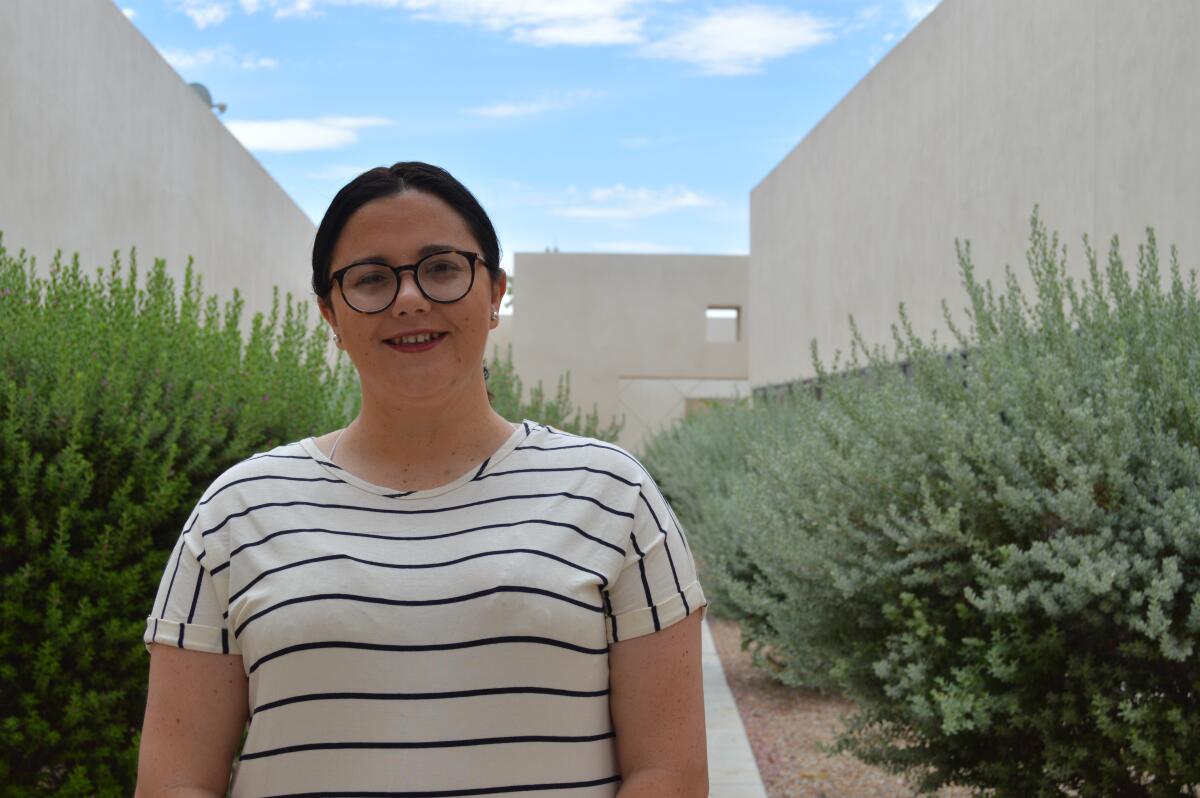Trump is challenging what it means to be American, and naturalized citizens are unsettled

- Share via
On the day Donald Trump was inaugurated president, Sonora Jha was walking past a group of white men at a work site in downtown Seattle when one told her, “Go home!”
Jha, shaken, didn’t know whether to confront the men or let it go: This was her home. After immigrating from India, the author became a naturalized American citizen in 2016. An equal, or so she thought.
When President Trump’s supporters chanted a new version of that threat against his critic U.S. Rep. Ilhan Omar, calling for Trump to “send her back” to Somalia, the familiar words jolted Jha and other naturalized citizens.
“It does make us afraid,” said Jha, 51. “For immigrants who are naturalized citizens, there’s a sense of shame when something like this happens in the country that you call home.”
Trump has stoked racial animosity unlike any other president in recent history, challenging what it means to be a U.S. citizen by transforming the nation’s immigration policies and accusing opponents of not belonging in America.
Trump first rose to political prominence by questioning the birthright citizenship of Barack Obama, falsely claiming the nation’s first black president was born in Africa. During Trump’s time in office, his administration has waged a wide-ranging battle to implicitly limit both legal and illegal immigration from predominantly black, brown and Muslim countries, with the president saying that “we should have more people from places like Norway.”
Now, as Trump seeks reelection, he has played to his overwhelmingly white base by telling several prominent congresswomen of color who have criticized him to leave the country, even though three were born in the U.S. and the fourth is a naturalized citizen.
If the president is seeking to drive a wedge into the country, it’s worked: He has energized supporters while upsetting many of the nation’s 20 million naturalized citizens, who feel that their identities and equality as Americans have come under attack.
“Everything that has come out of Trump’s policies now makes us feel like we’re not first-class citizens,” said Martin Rosenow, 66, a legal assistant in Florida’s Broward County who immigrated from Colombia in 1979 and was naturalized in 1996.
The “send her back” taunt — implying that Omar should be stripped of her citizenship and deported — particularly infuriated Mariella Farfán, 48, a financial analyst who lives in Miramar, Fla.
“I feel insulted,” said Farfán, who immigrated from Peru at 18 years old in 1989 and became a U.S. citizen in 2005. “He’s trying to change what it means to be a U.S. citizen.”

The crowd chanting “send her back” at a North Carolina rally was inspired by a Trump tweet telling Omar, a Minnesota Democrat who came here as a refugee from Somalia, and U.S.-born Reps. Alexandria Ocasio-Cortez of New York, Rashida Tlaib of Michigan and Ayanna Pressley of Massachusetts to “go back” to the countries they supposedly came from. The insult was instantly familiar to many Americans of color.
“I’m a Chinese American. I grew up hearing this on a playground: ‘Ching chong, go back to where you came from,’” said Mae Ngai, a Columbia University history professor and citizenship expert who was born in the Bronx. “Excuse me for being so frustrated, but there’s not a lot to parse here. This is just racism.”
Trump has “unleashed something that’s always been just barely beneath the surface for racism against people of color,” Ngai said.
The United States has allowed naturalization since 1790, though racial exclusion long dominated the nation’s immigration policies. New citizenship was limited to “a free white person,” before being expanded to include Mexican Americans under the Treaty of Guadalupe Hidalgo in 1848 and former slaves under the 14th Amendment in 1868.
The nation continued to racially restrict citizenship with laws such as the Chinese Exclusion Act of 1882; limits on immigration from countries outside Western and Northern Europe weren’t fully lifted until the mid-20th century.
I’m insulted. He’s trying to change what it means to be a U.S. citizen.
— Mariella Farfán, a financial analyst who became a U.S. citizen in 2005
Today, citizenship requires five years of legal permanent residency, an ability to speak English, “good moral character,” passing a civics exam, and an oath to “support and defend the Constitution.” The nation now swears in about 700,000 naturalized citizens a year; once granted, citizenship can only be revoked if the government finds it was obtained fraudulently.
Naturalized and natural-born citizens are otherwise full equals under the law, thanks to the 14th Amendment, with a single exception: the ability to become president, which the Constitution limits to “a natural born Citizen.”
That is exactly the exception Trump exploited to rise to prominence as a political force among conservatives. He first questioned the birth-by-soil citizenship (a legal principle known as jus soli) of President Obama, who was born in Hawaii; he later questioned the eligibility of his 2016 primary opponent Sen. Ted Cruz of Texas, who was born in Canada but received natural-born citizenship by blood (known as jus sanguinis) through his American mother.
Since arriving in office, Trump has opposed amnesty and a path to citizenship for the roughly 10.5 million people thought to be living in the U.S. illegally, and he has threatened to deport them. He has also battled to limit the kind of entry that could precede citizenship by attempting to build a border wall, banning travel from several majority-Muslim countries, cracking down on asylum claims and pushing to end refugee admissions.
Last year, Trump also threatened to attempt to end birthright citizenship for babies born on U.S. soil, though his proposed executive order had little hope of survival against the 14th Amendment.
“We’re the only country in the world where a person comes in and has a baby, and the baby is essentially a citizen of the United States ... with all of those benefits,” Trump told Axios, incorrectly. (About 30 countries have birthright citizenship policies.) “It’s ridiculous. It’s ridiculous. And it has to end.”
The Trump administration created a task force last year to investigate naturalization fraud, which has led to a rise in the nation’s rare instances of denaturalization.
With all of Trump’s policies taken together, “what the administration is doing now is not exactly subtle, but it’s a way to use the concept of citizenship and naturalization for racial exclusion,” said Hiroshi Motomura, a law professor at UCLA and a naturalized citizen who was born in Japan. “All of that is pandering to a time when immigrant and citizenship rules were more discriminatory.”
Opposition from naturalized citizens may not be much of a barrier for Trump to be reelected. Native-born voters outnumber naturalized voters more than 10 to 1.
California has the nation’s largest share of naturalized citizens, with 5.3 million, making up 13.5% of the state’s population, according to the most recently available Census estimates from 2017. New York, New Jersey, Florida and Hawaii are the other states where naturalized citizens make up a double-digit share of the population.
Of the 15 states that have added the largest per capita shares of naturalized citizens since 2015, only Florida and Texas swung to Trump in 2016, according to federal naturalization data.
Data suggest race plays a role in immigrants’ political engagement in a way that cuts against Trump’s predominantly white base of voters.
Naturalized white Americans were less likely to vote than native-born whites, but the opposite was true for Americans of color: Naturalized citizens who are black, Asian and Latino were more likely to vote than their natural-born counterparts, according to U.S. Census Bureau data from 2016 and 2018.
Mayra Salinas-Menjivar, a Las Vegas attorney who became naturalized after fleeing El Salvador as a child, said it made sense that naturalized Latinos were more likely to vote than those born in the U.S.
“You don’t know what you have until you don’t have it,” Salinas-Menjivar said.
Roberto Rodriguez-Tejera, 66, a Cuban-born naturalized citizen who hosts a Spanish-language radio show on Miami’s Actualidad 1040-AM, said Trump’s provocations have made his listeners feel “hurt.” But Rodriguez-Tejera said it only made him more defiant about defending his American-ness.
“Go back to Cuba? Go back to Venezuela? Go back to Haiti? This is our country, and we’re going to fight for it, and we’re going to fight for what the United States of America stands for.”
Maria-Teresa Liebermann, 34, deputy director of Battle Born Progress in Las Vegas, a public relations firm for progressives, came to the U.S. with her Mexican family as a child. She still cries when she thinks about the moment she took the oath of citizenship at 17.
“It was one of the most emotional moments of my life, because I didn’t realize how ...” Liebermann paused, her voice cracking as she became tearful. Until she said the oath, she hadn’t fully grasped the weight of what it would mean to become a citizen, and what it would mean for the rest of her life.
She remembers how she swore to defend the Constitution and the U.S. “against all enemies, foreign and domestic.”
“Seeing Trump as president, now I keep thinking,” Liebermann said, “is that the ‘enemy’ that this oath is talking about?”
More to Read
Get the L.A. Times Politics newsletter
Deeply reported insights into legislation, politics and policy from Sacramento, Washington and beyond. In your inbox three times per week.
You may occasionally receive promotional content from the Los Angeles Times.














